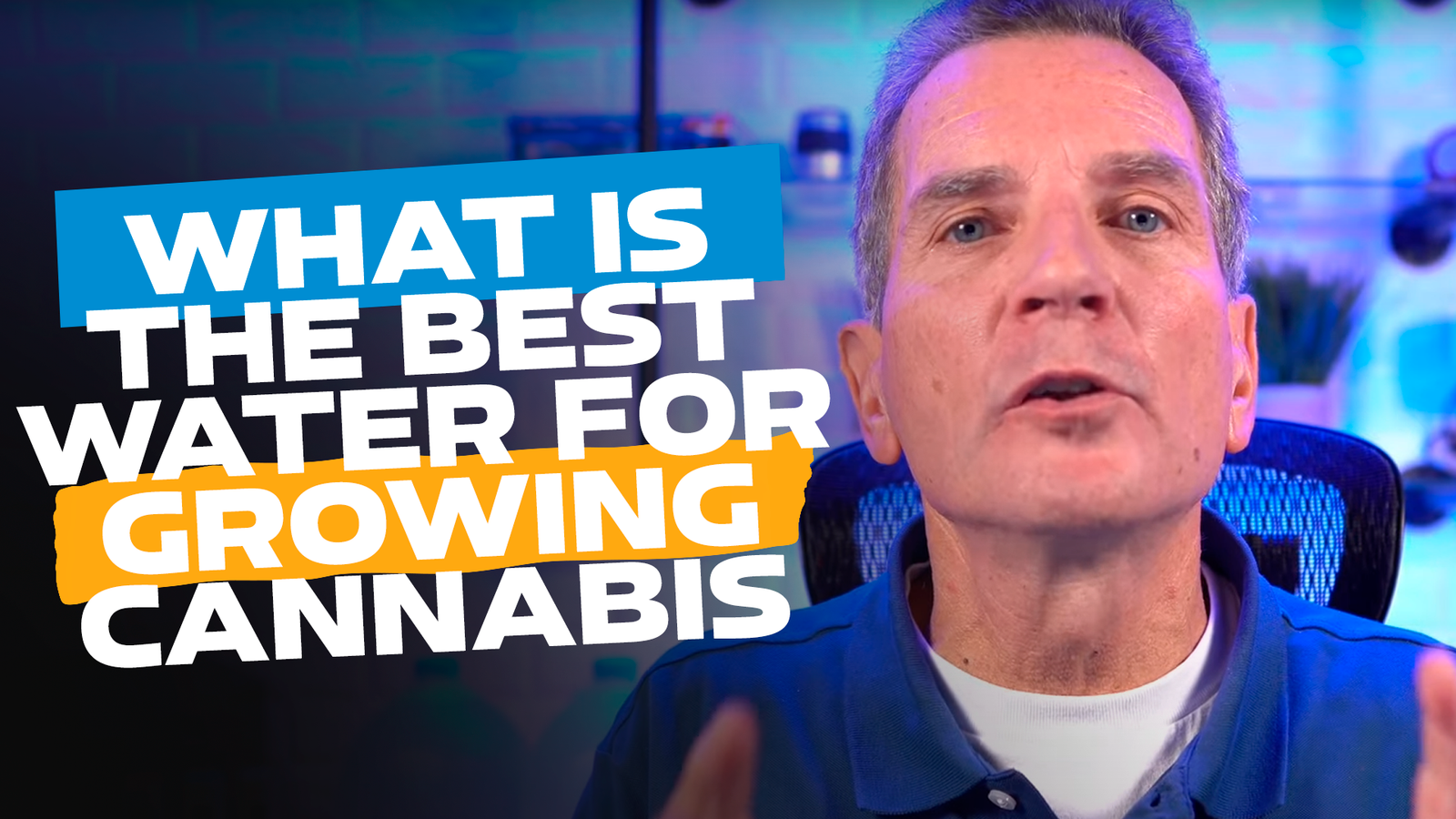
A lot of people ask us about the best type of water to use when growing something. And, after growing cannabis became legal in Canada, we’ve noticed more and more people asking us about the best type of water to use for that.
Most people assume they can do better than the water coming from their tap, but they don’t know where to start. They may have heard different things about reverse osmosis water, or distilled water. Is using either of those better than collected rainwater or lake water?
We like to simplify things and help people make the most informed decisions about investing in water, no matter what their needs may be.
This blog will walk you through the various types of water you might consider to grow cannabis, and the pros and cons of each. Remember, although we’re going to speak in very general terms, it’s paramount to know that not all well waters are the same, and not all municipal waters are the same. Testing is the only true way to really know what you’re working with and how it will impact your plants.
Disclaimer: This information is only for people 21 years of age or older, who live in an area where it's legal to grow cannabis. We do not support illegal activity of any kind.
Why Water Matters When Growing Cannabis
You need to know what's in your water. Using the wrong kind of water makes your plants much more susceptible to illnesses, insects, and fungi.
To get the best results, you always need to work within the correct pH and EC range to make sure your plants absorb everything. Keep in mind that these ideal levels vary depending on the phase that your plants are in and the strain that's being grown.
This is why it’s absolutely crucial you have both a pH and an EC (electroconductivity) meter. The pH tells you how acidic your water is (or isn't). Whereas, EC or TDS tells you the amount of total dissolved solids in the water. The goal is to use a water source that has a pH of 6.5 or less and TDS of 200 parts per million or less.
You need to start with water that's very low in EC. As you add nutrients and other products to your water, the plants need to be able to absorb it. If the EC or TDS numbers are too high, the plants can't absorb nutrients. This causes nutritional deficiencies and an increase in minerals that your plants just can't absorb. This will eventually stop your roots from absorbing anything, which will obviously kill those plants if it isn't corrected.
Municipal Water
The biggest issue you’re going to run into is unpredictability. We’ve tested municipal water with a TDS as low as 100 parts per million and as high as 600 parts per million. The latter is far, far too high.
At the same time, your pH numbers can be anywhere from 7.0, to 7.5, to 8.0. Again, this is way too high for growing cannabis. You also need to remember all of the things that municipalities put in their water to keep it colourless, odourless, and keep the bacteria down. All of those things are super hard on plants.
Is the answer simply getting a water softener and/or getting something to remove the chlorine from municipal water? Sadly no. Your TDS will still be incredibly high.
Well Water
Well water comes from the ground and it’s all-natural. So, it must be perfect, right? Probably not.
Once again, your numbers are going to be all over the map. We’ve tested well water as low as 100 parts per million, and as high as 4,500 parts per million, which is super high in sodium. We’ve also tested well water that's high in calcium & magnesium, which is hard water. That’s not good for plants.
The pH numbers are also going to be all over the map, while you could be looking at bacteria problems. If that’s the case, you could potentially look at ultraviolet light to kill that bacteria. You can learn more about this process by clicking here.
River or Lake Water
This is another natural choice. But is it a natural fit to grow cannabis? Probably not.
A lot of rivers and lakes are contaminated and polluted. You’ll still need your TDS meter and your EC meter, but you’re also going to need a lot more to test lake and river water. You need to check it with your municipality to find out if those rivers and lakes are polluted with nitrites, nitrates, or things like that.
It's often a bad choice.
Rainwater
Farmers and golf course owners love rainwater. It leads to greener greens and healthier crops. But will it work for you? Maybe.
It’s all about how you’re collecting and storing it. For example, the rain falling from the sky is clean, but if it runs down your roof before you collect it, it’s going to pick up some dirt or bird poop along the way and that’s obviously bad.
Bottled Spring Water
Springwater comes from the ground and it’s fit for human consumption. This tells us that it doesn't have any bacteria and we know it doesn’t have any chlorine. That’s a good start.
As always, it’s all about the numbers you see when testing. We need to make sure the pH is 6.5 or less. Spring water is usually not that low. It’s often very high.
You also need to pay attention to the mineral content. One brand may be as low as 75 parts per million, while we’ve seen other brands as high as 600 parts per million. That's no good for growing cannabis.
Condensation Water From an Air Conditioner or Dehumidifier
This collected condensation is similar to distilled water.
If you're in a very warm area, you might have a lot of that kind of water available. But as always, you have to test it because that water is often very low in pH, so you will need to correct it.
Distilled Water
The lowest EC is almost always going to be distilled water. The pH of that water is very low too. Is that a good source? Absolutely! Is it the best source? Well, that all depends.
The problem with distilled water is you either have to get a distiller yourself (very high-maintenance and very expensive) or you need to buy distilled water. That can be expensive, inefficient, and not a lot of fun.
Reverse Osmosis Water
With reverse osmosis water, the mineral content isn’t quite as low as distilled water (almost, but not quite), but you’re going to remove about 90% of minerals.
Generally speaking, home reverse osmosis systems are affordable. They're also fairly small, readily available, and low maintenance. This is why you will often hear that cannabis growers use reverse osmosis water. Check out our HUM Water Saver 75 High Efficiency Reverse Osmosis Systems here https://waterestore.com/products/hum-water-saver-reverse-osmosis-system-75-gallons-per-day
If you want to learn more about these systems, click here.
The Verdict
Once again, we’ve made a lot of generalizations in this blog. But we’ve also made it very clear that you need to test any water you’re considering to grow cannabis.
However, in most situations, the best water choices are:
1. Reverse osmosis water
2. Distilled water
3. AC or dehumidifier water
4. Bottled mineral or spring water
5. Rainwater
After that, you’re in “probably not a viable choice” territory, with the next best options including:
6. River or lake water
7. Well water
8. Tap water from a municipal water source
You Have Water Questions. We Have Answers
If you want to learn more about water filtration systems, check out our YouTube channel. Or, you can contact us by clicking here.

